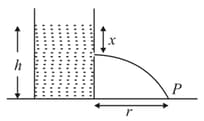Bernoulli’s Theorem and its Applications
Bernoulli’s Theorem and its Applications: Overview
This topic covers concepts, such as, Bernoulli's Theorem, Conditions on Bernoulli's Theorem, Properties of Ideal Fluid & Motion of the Ping-Pong ball etc.
Important Questions on Bernoulli’s Theorem and its Applications
Calculate the rate of flow of glycerine of density through the conical section of a pipe if the radii of its ends are and the pressure drop across its length is
A jet of water having velocity and stream cross-section hits a flat plate perpendicularly, with the water splashing out parallel to plate. Find the force that the plate experiences
How does Newton's third law apply ping pong?
What law of motion is ping pong?
Are ping pong balls pressurized?
How does the floating ping-pong ball work?
What is the force of a ping-pong ball?
A non-spinning ball is not subjected to the Magnus effect. This Magnus effect is equivalent to :
Which of the following forces are acting on a non-spinning ball during its flight:
Motion of ball without spin in air follow the path
If pressure on the ball at the top be and bottom be then for ball moving without spin
When the moves with spin in air then at its top and bottom part pressures are represented by and respectively then which of the following are correct.
Motion of ball with spin in air follow the path
Potential energy term of Bernoulli's equation is not considered for its application in:
The potential energy term in Bernoulli's equation is present due to:
Bernoulli's theorem is a restatement of :
The figure below shows a cylindrical tank filled with water upto a height A hole is punctured on the side of the tank, at a distance below the water level. Water exits the hole and hits a point (at a distance from the base of the tank). Which of the following is true ?

A cylindrical vessel of radius is filled with water up to a height of . The cylinder is open to atmosphere at the top. A small aperture of radius is made on the side of the cylinder at a height of from the bottom of the vessel. For approximately how long will water leak out of the aperture?
Which one of given option is more suitable for studying about fluid mechanics?
Which of the following is an example of fluid statics?
